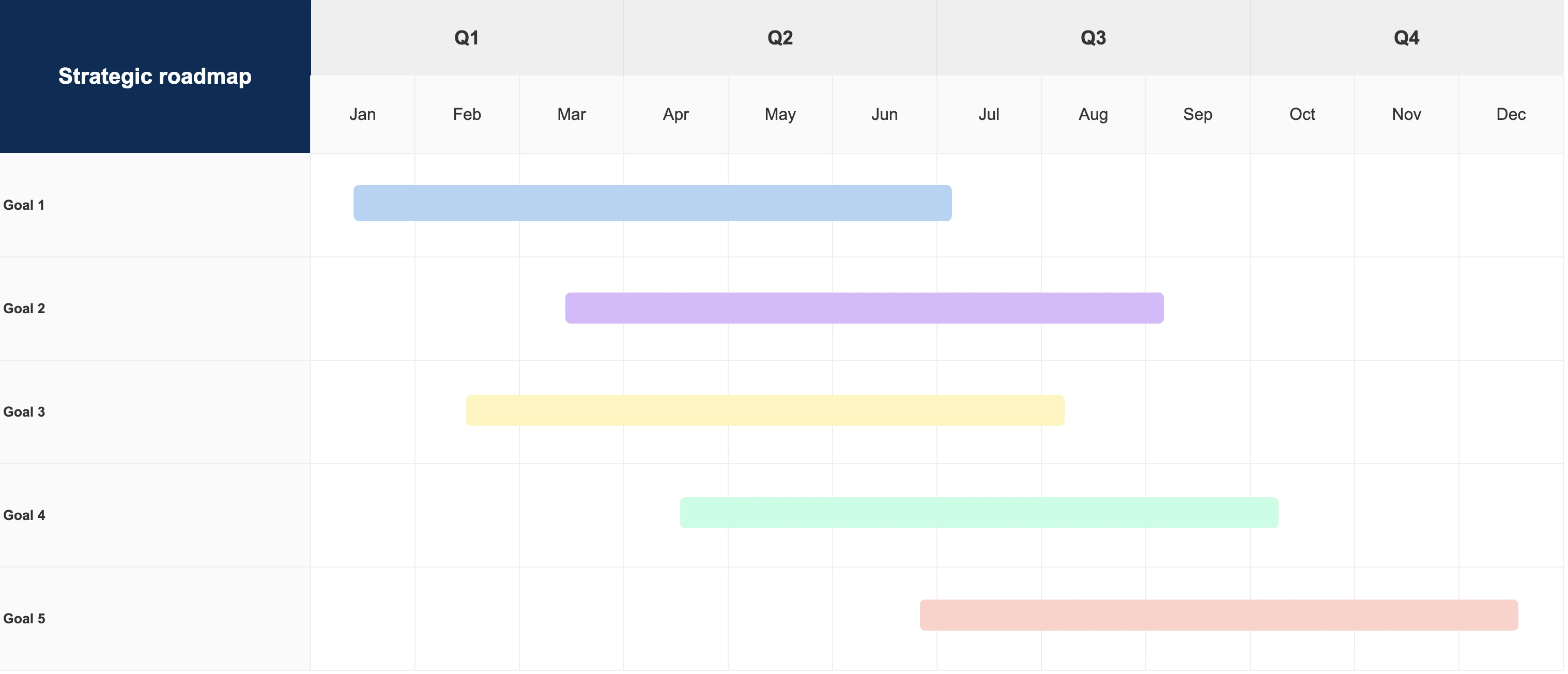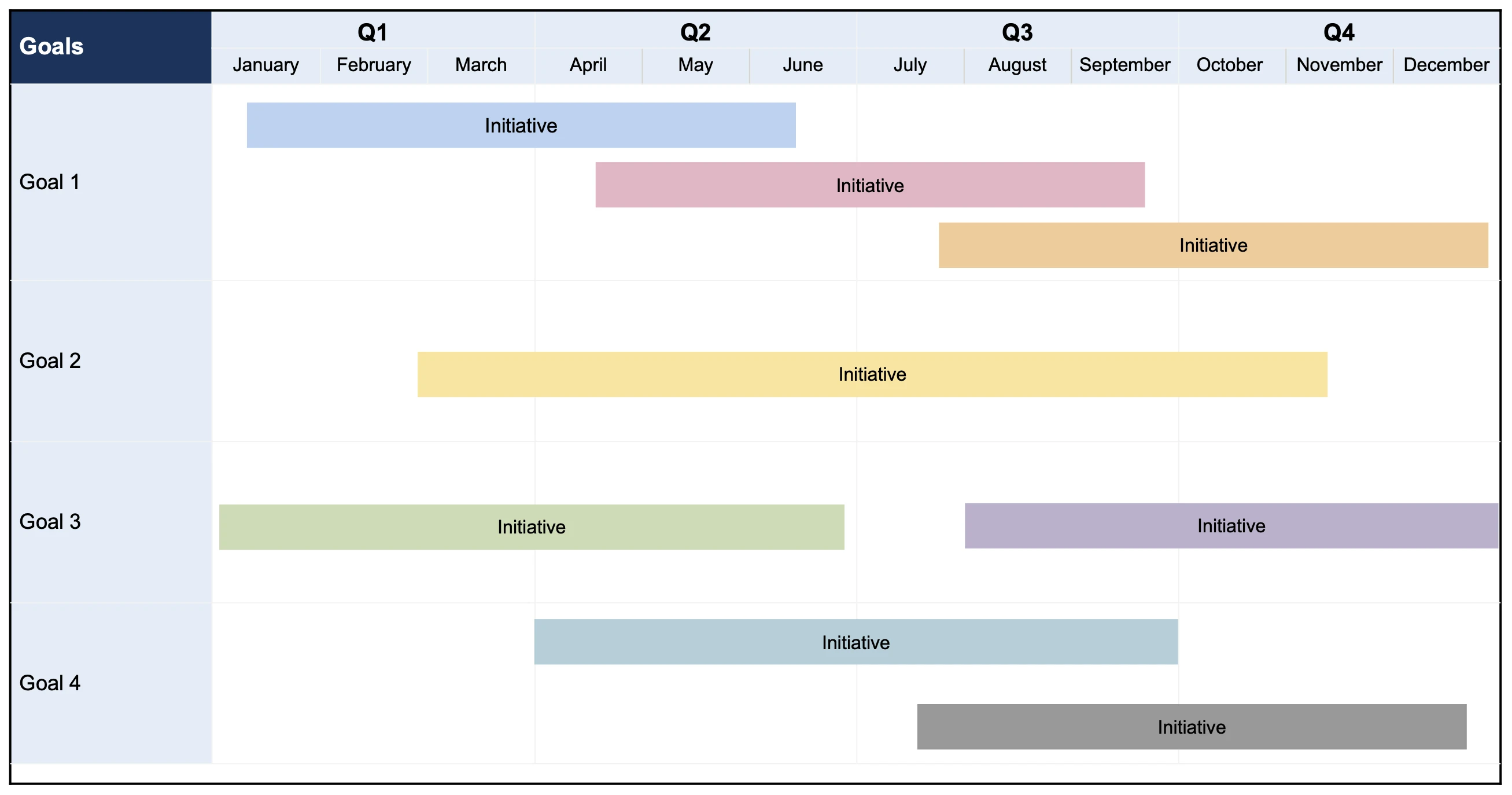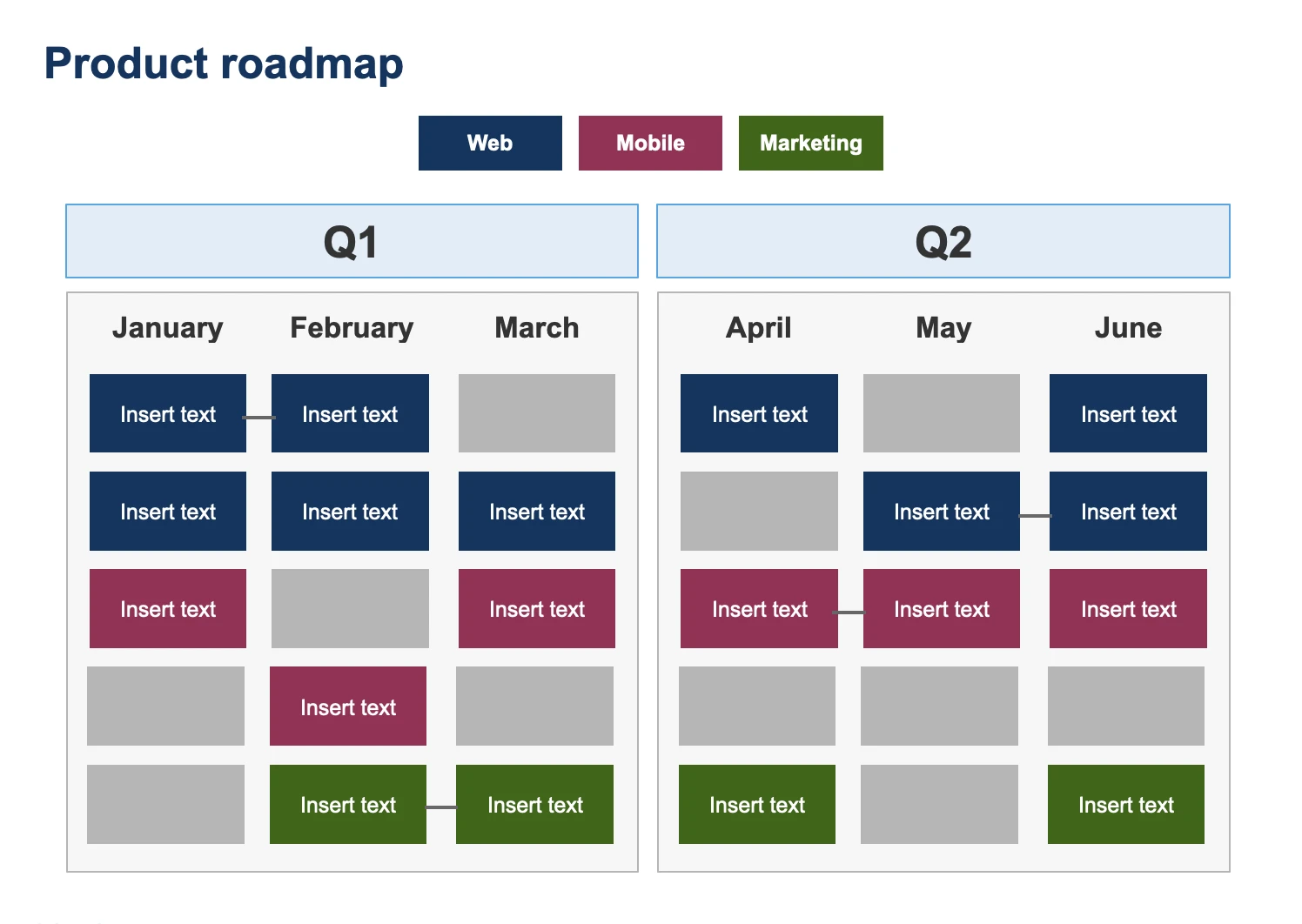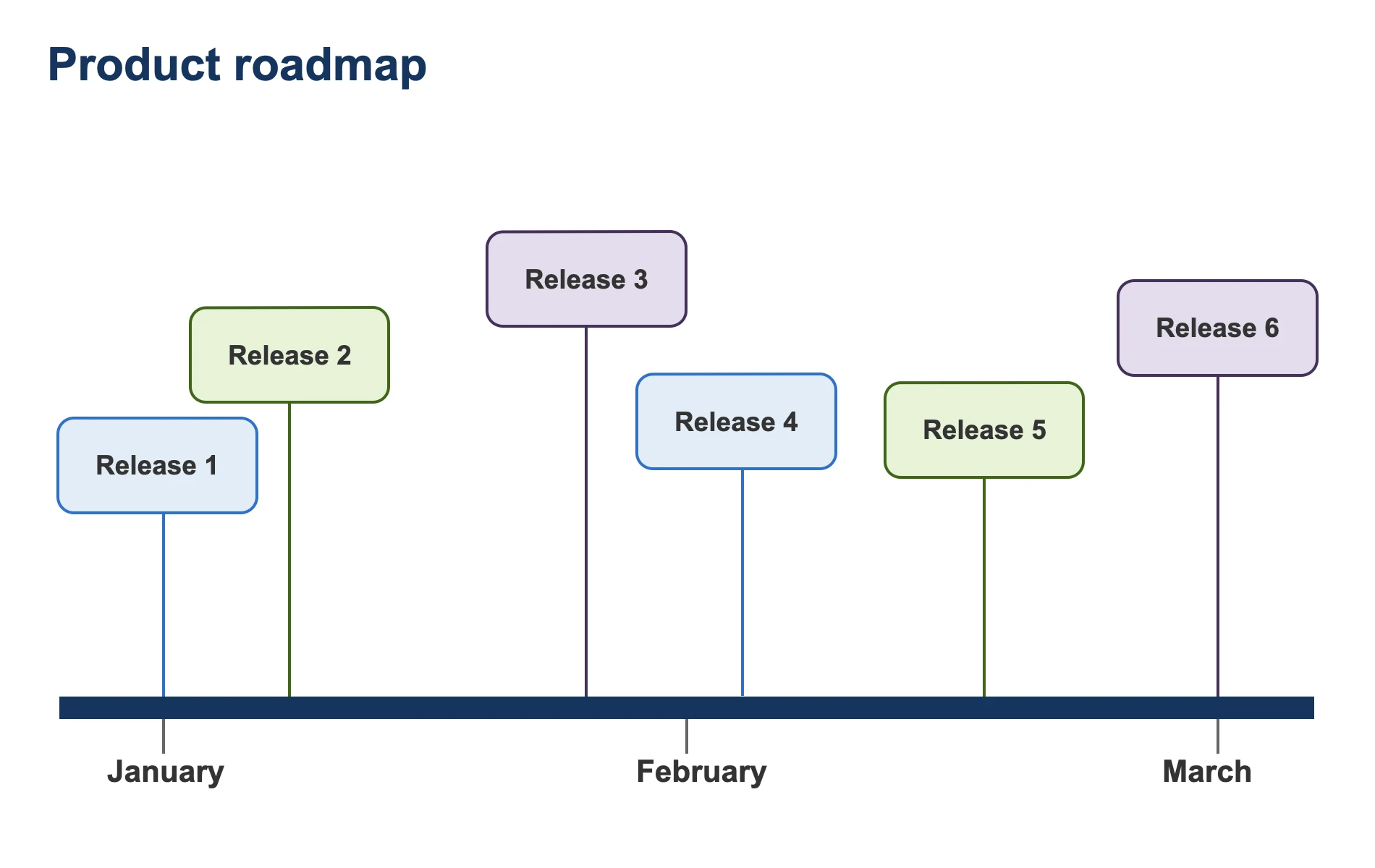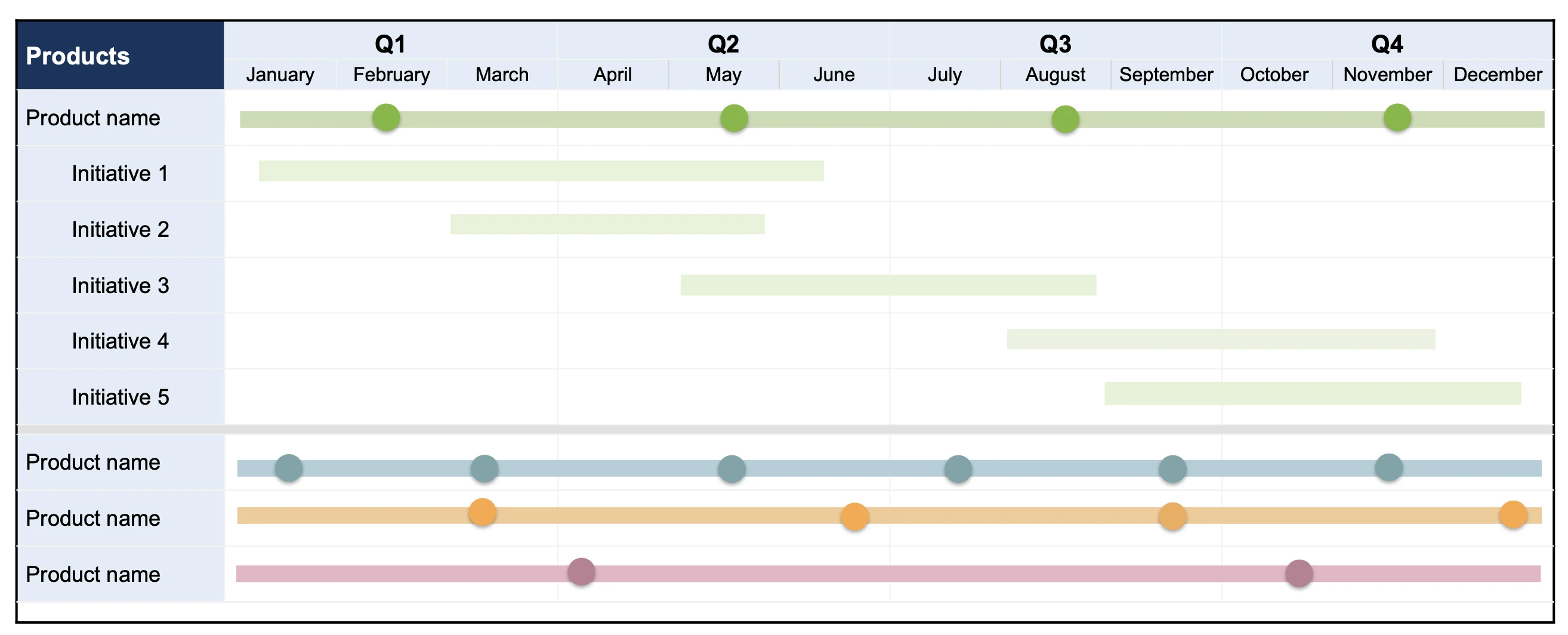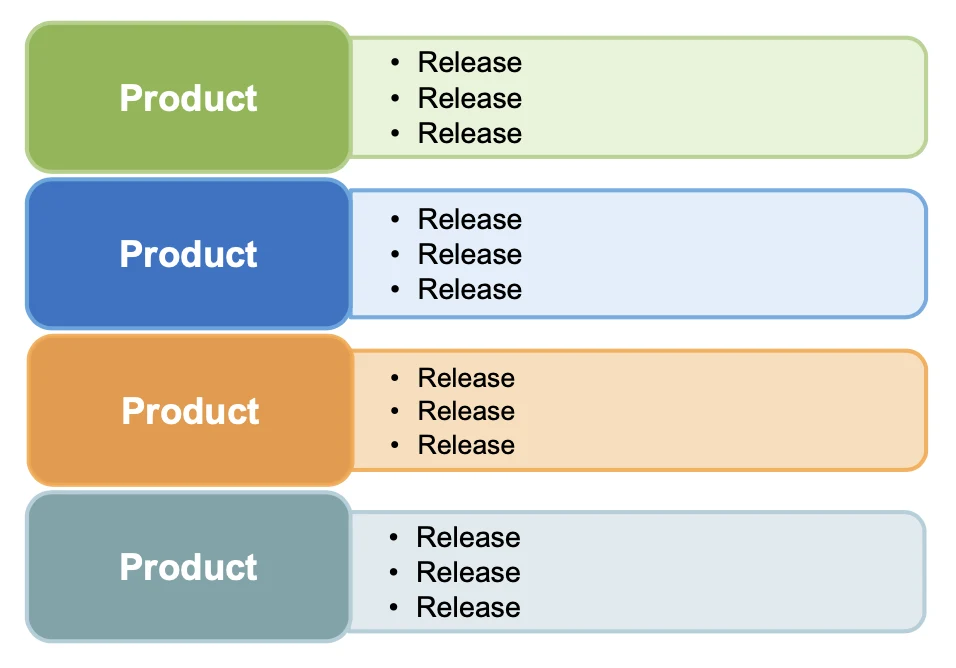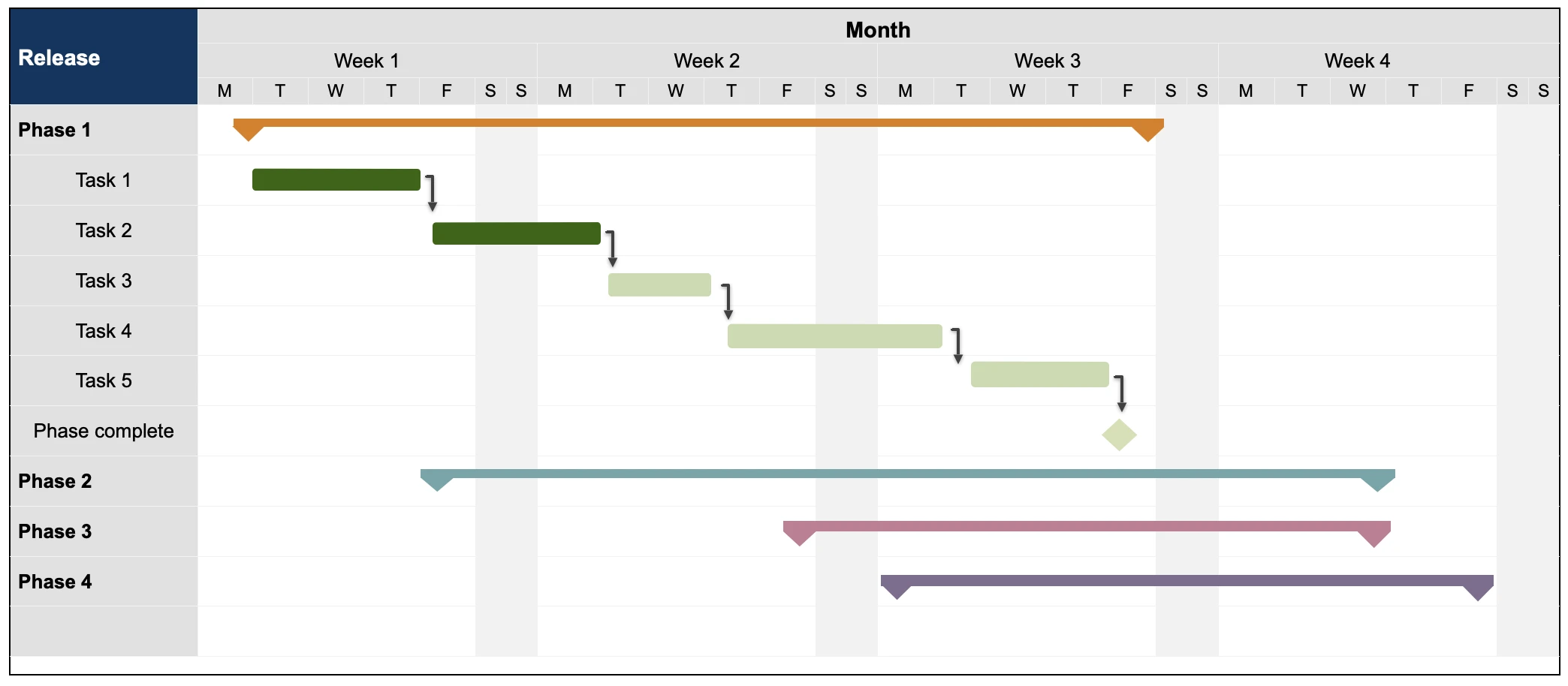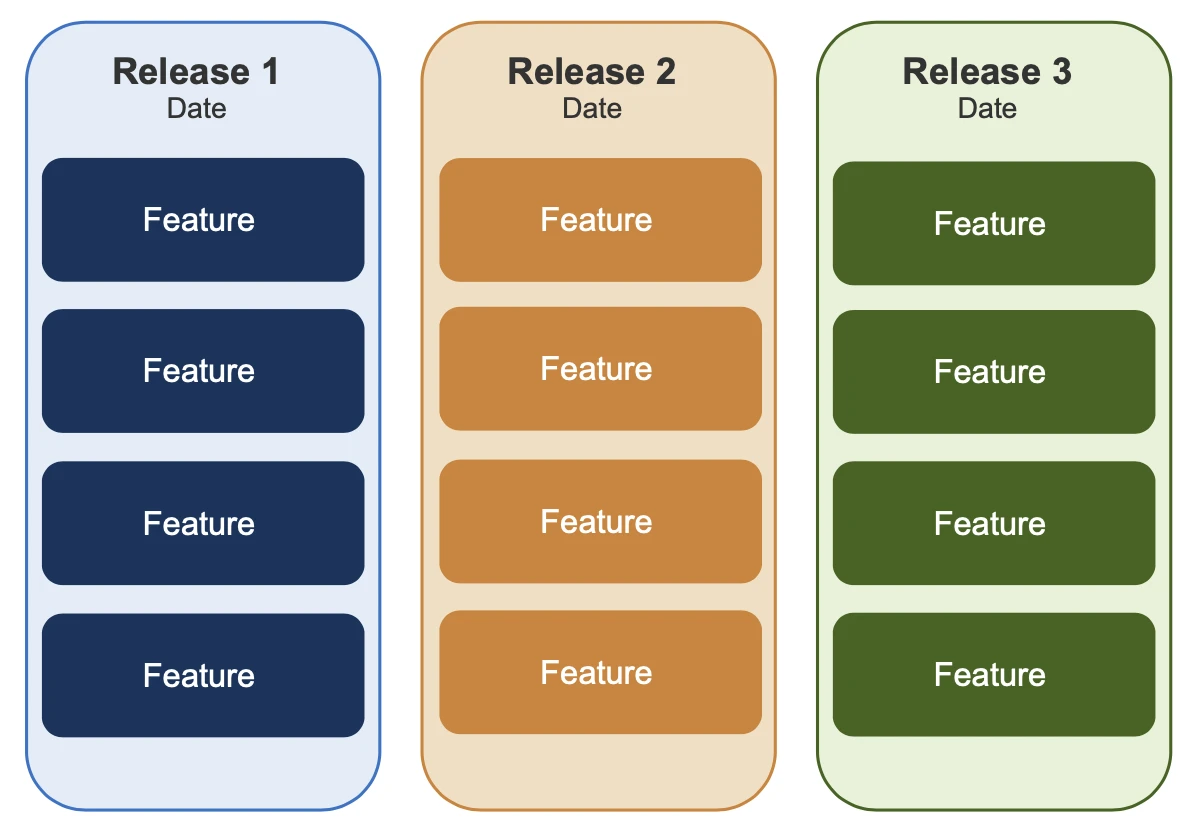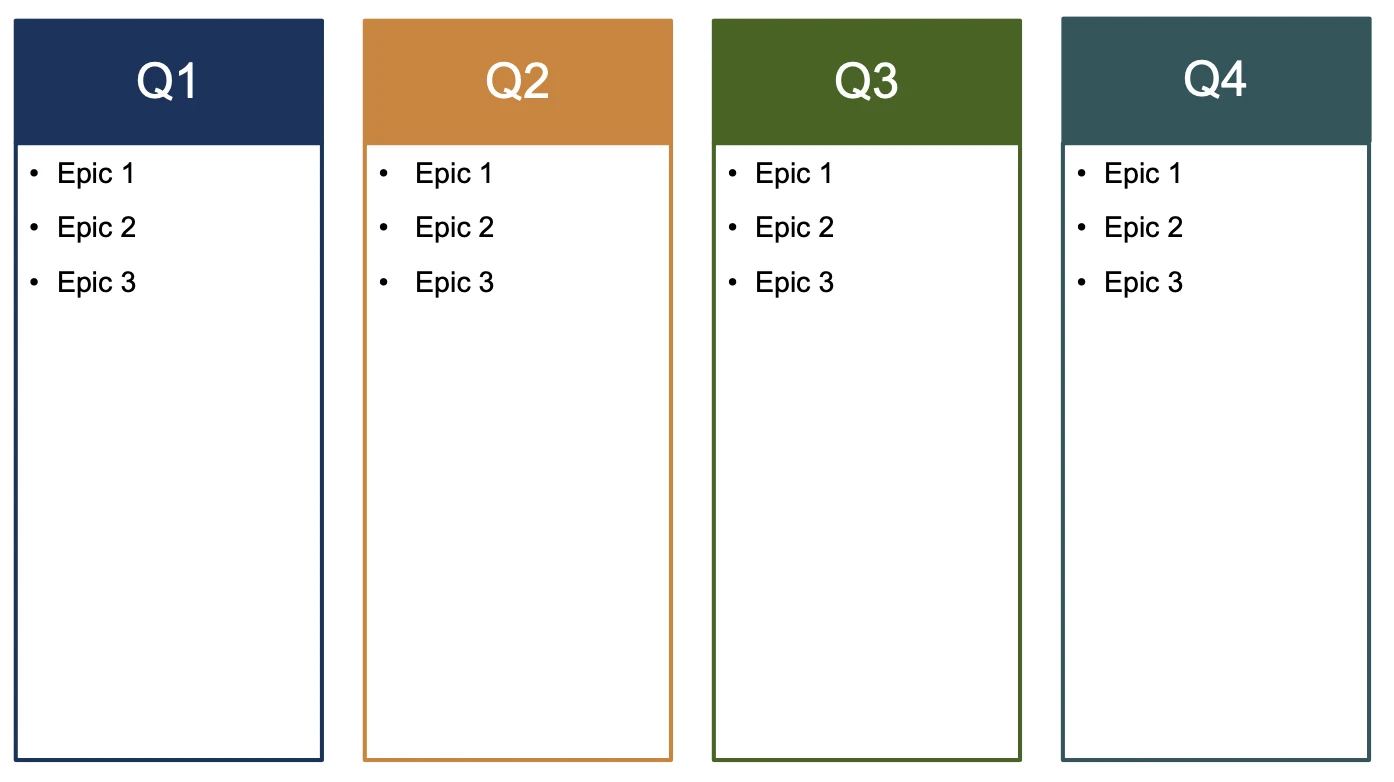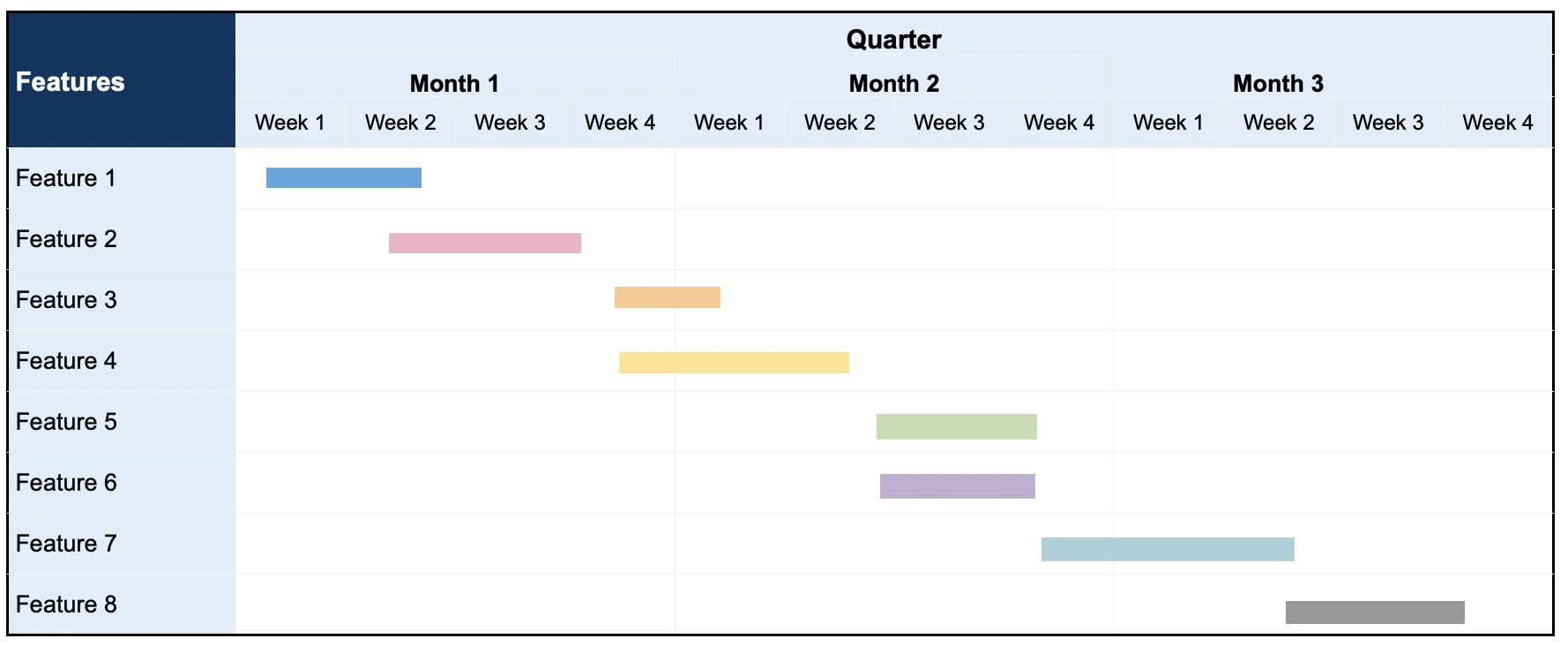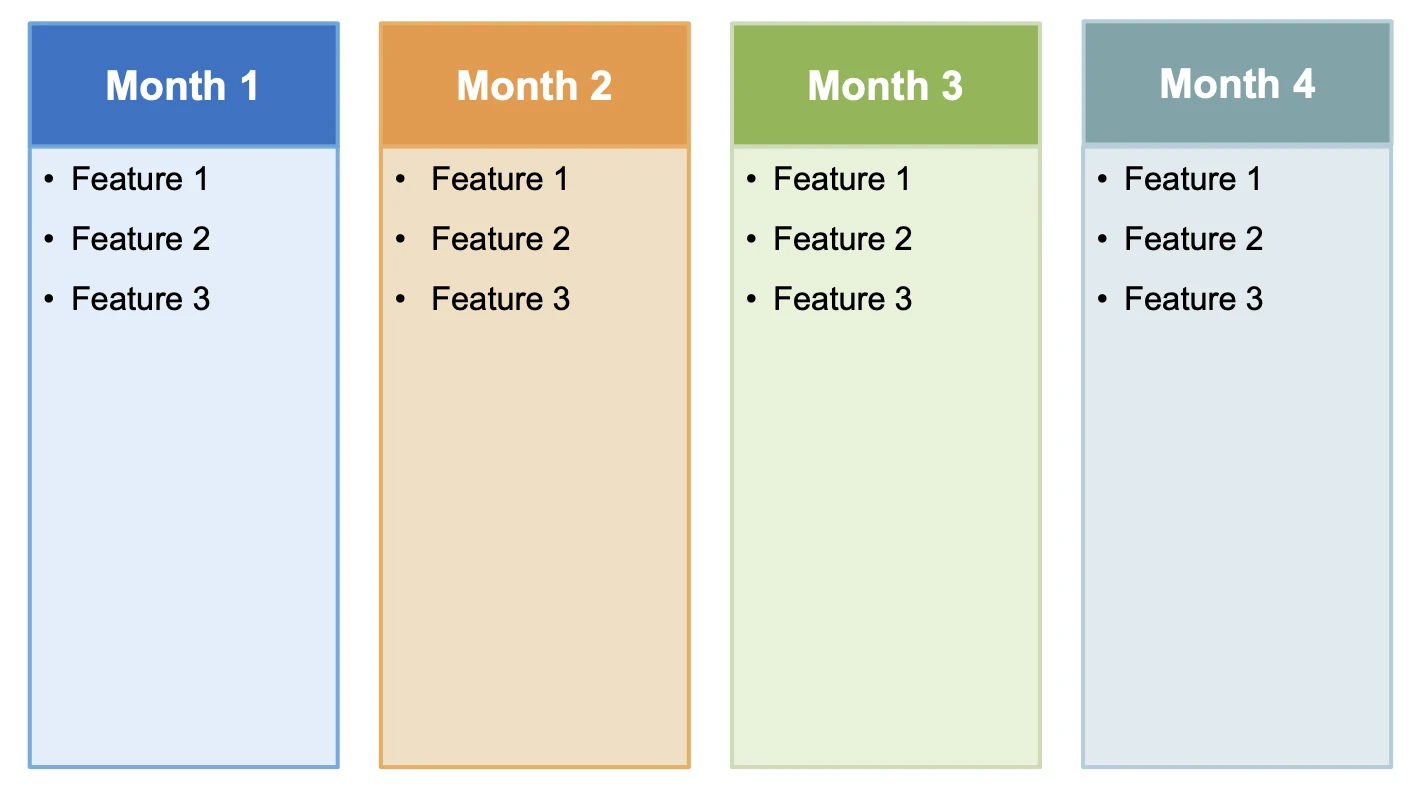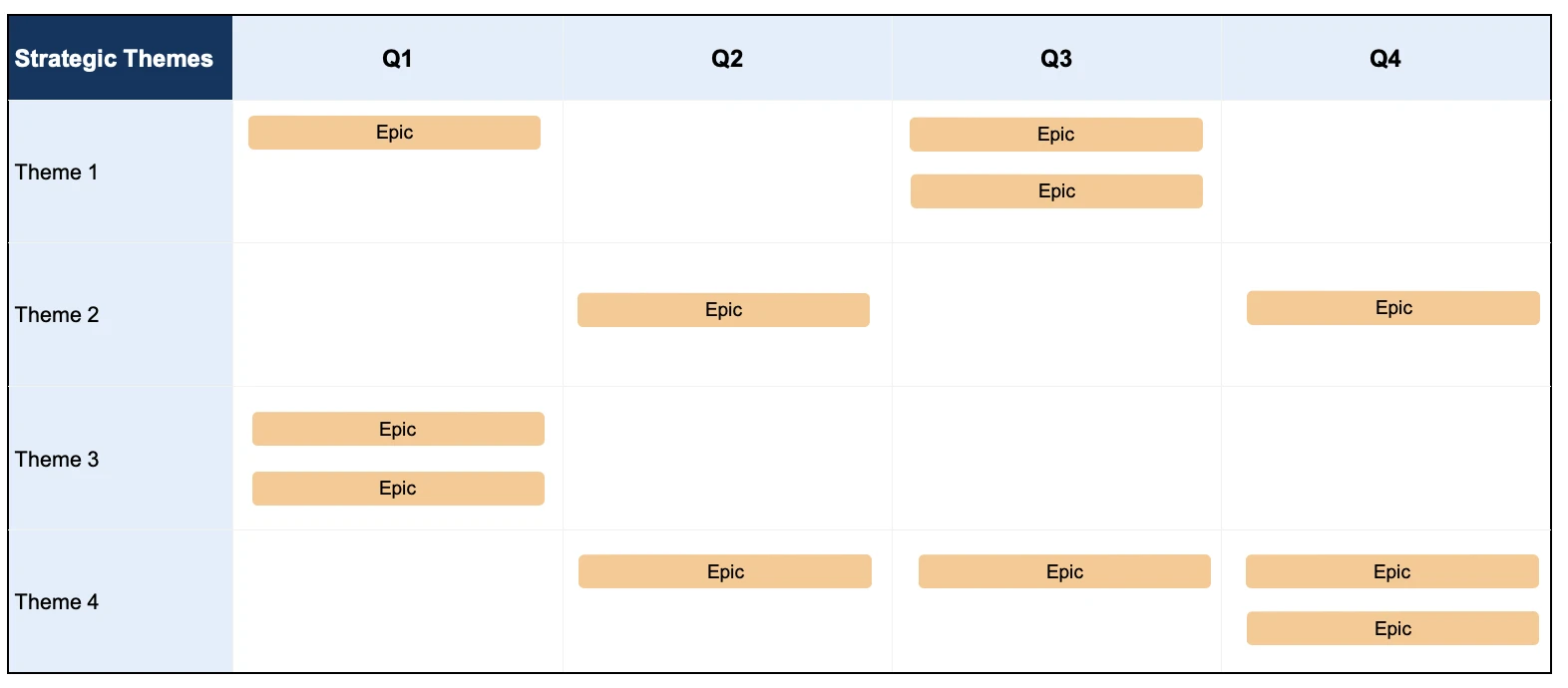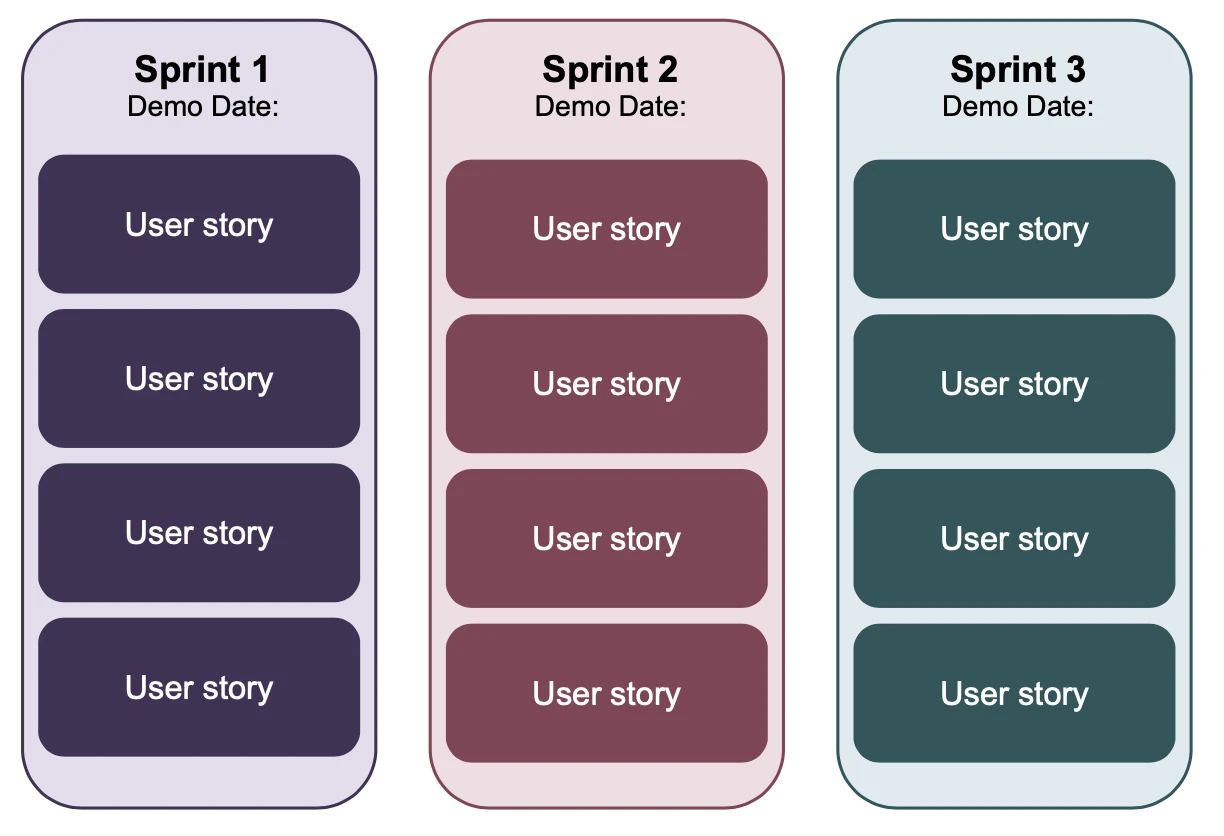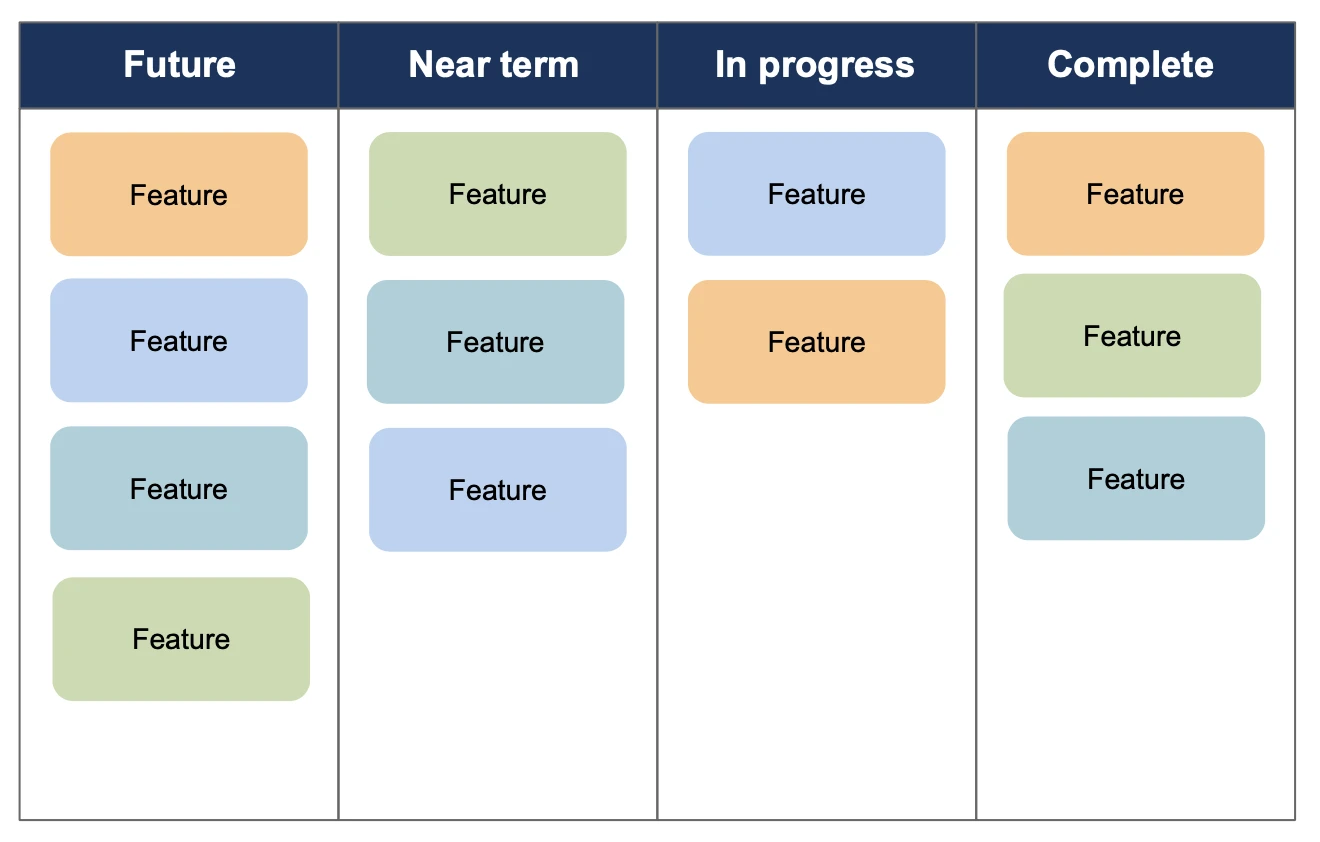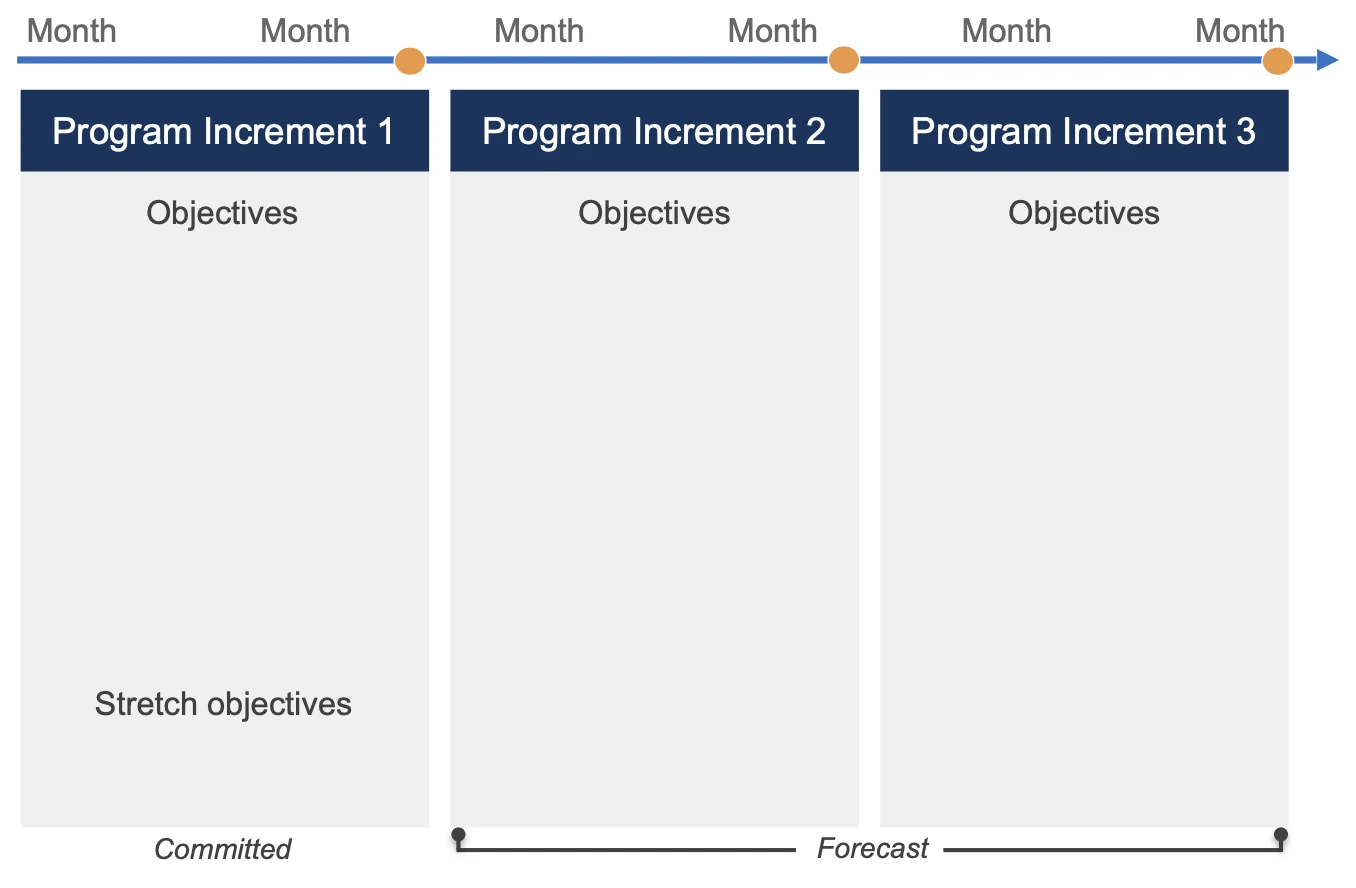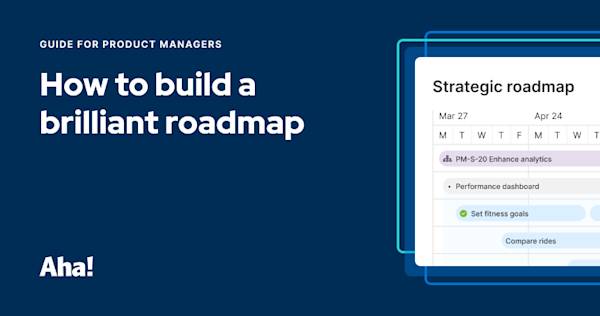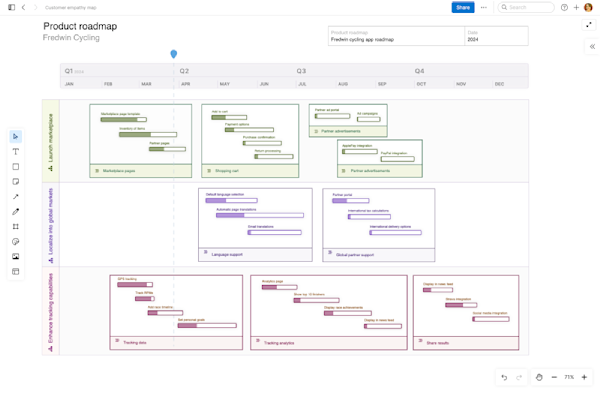20+ product roadmap templates for product teams
Get started fast with sample product roadmaps
Last updated: August 2025
Quickly build effective visuals of your plans with guided product roadmap templates. Learn which components to include and see examples of different types of roadmaps that product managers can customize for different audiences. |
Product roadmaps are multipurpose visual tools. Every product manager needs one — several, actually. A strategic roadmap can reveal a compelling story about your product goals. A release roadmap highlights the timing of when you will deliver new functionality for customers. And a features roadmap can align your agile development team on timing and priorities. Together, these different roadmaps paint a complete picture of your product plans.
But where to start? What is the best approach for your product development team? Some teams can get by with building and managing product roadmaps in static spreadsheets or presentations. (And we have plenty of those that you can download for free from this guide.)
Most teams quickly tire of playing version control whack-a-mole. It is hard to showcase progress when you are worried about outdated roadmaps floating around. All that value you plan to deliver to users and to the business gets overshadowed when an executive presents a now-obsolete roadmap to stakeholders.
Many organizations experience transformative gains by choosing a robust roadmapping tool like Aha! Roadmaps. It includes everything you need to build breakthrough products — from setting strategy to creating product plans and measuring value. But sometimes, you will want to sketch out ideas that you can quickly visualize on a timeline. For this, we also offer lightweight whiteboard templates.
Build a roadmap on a whiteboard — try it now.
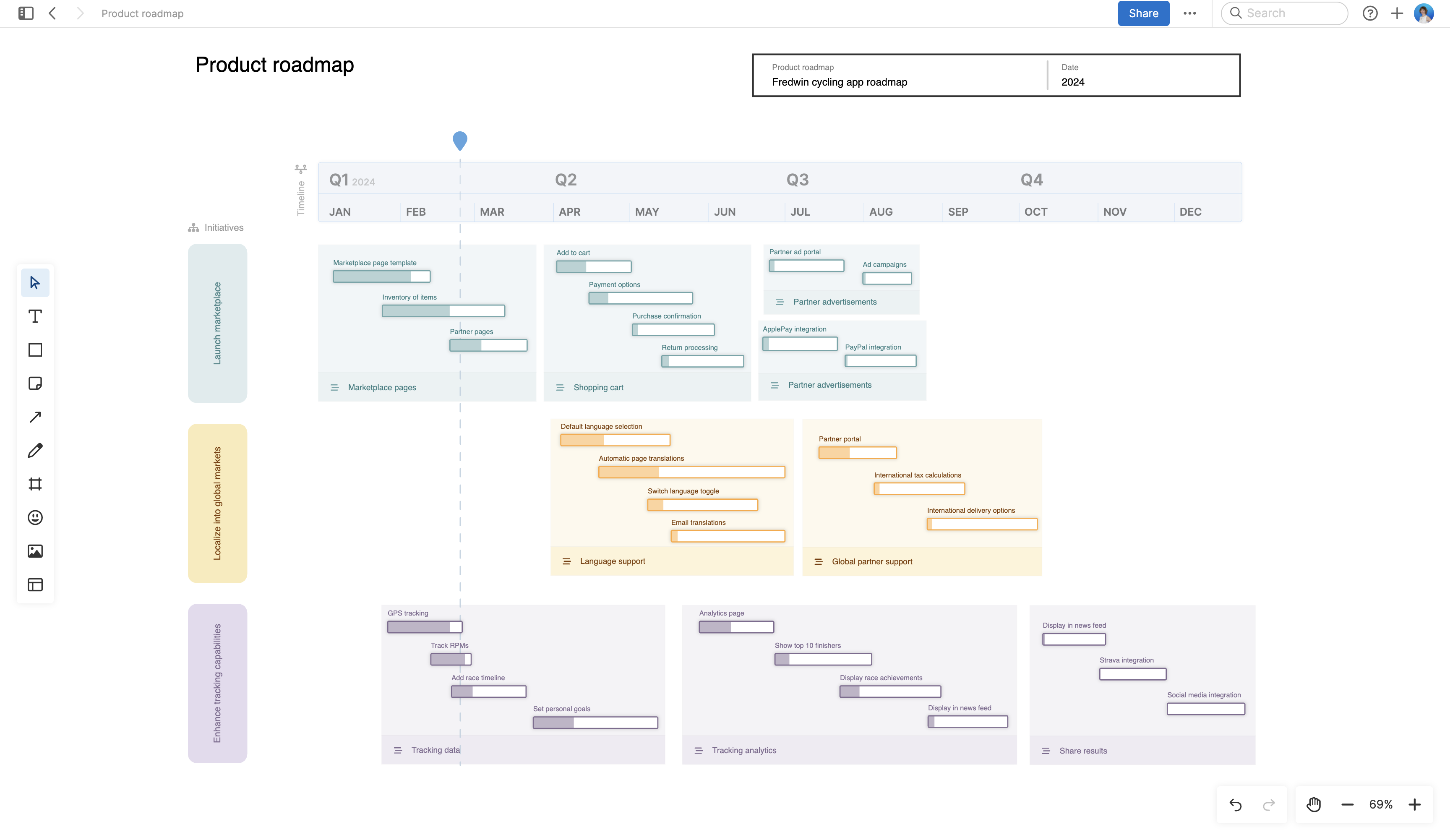
As your products and processes evolve, you may be ready for more robust and flexible roadmaps that are automatically updated and connected to your daily work. For example, the roadmap below — created in Aha! Roadmaps — provides a snapshot of strategic initiatives that can be drilled into to reveal the associated work items.
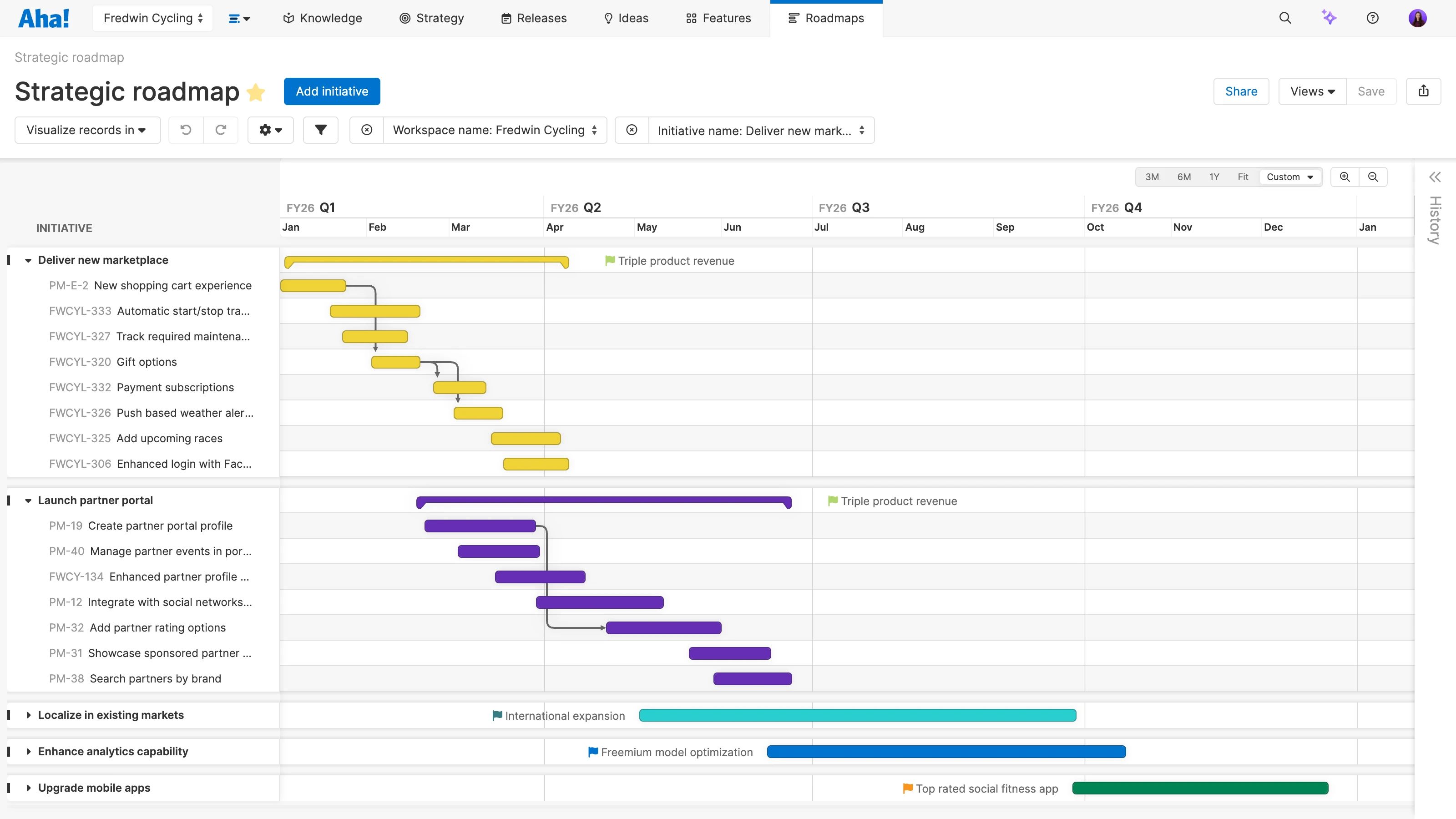
Not sure where to start with roadmapping? This guide includes some practical guidance, examples to inspire, and product roadmap templates you can start using right now. (There is also an FAQ section covering product roadmaps at the very end for quick answers.)
Guidance and product roadmap examples:
Free product roadmap templates:
Strategic product roadmap templates — including templates for goals and initiatives
Agile product roadmap templates — including templates for scrum, kanban, and SAFe®
Components of a product roadmap
Time and work. Distill a product roadmap down to its essence and those are the two main components that you will find. There will be some sense of timing, whether it is detailed down to specific dates or generalized to categories such as “now, next, later.” And there will be some representation of work, whether those are comprehensive releases filled with features or basic themes the product development team will pursue.
A product roadmap should answer:
Why are we doing this?
When are we doing this?
What exactly are we doing?
The products you build today represent the future of the business and a meaningful investment from the organization. Strategy is the underpinning of a successful roadmap. The items you choose to add to your product roadmap should be validated against your product goals and initiatives, rolling up to overall business strategy.
Some of the components you can expect to see on a product roadmap include:
Goals: Measurable, time-bound objectives with clearly defined success metrics
Initiatives: High-level efforts or big themes of work that need to be completed to achieve goals
Release: Delivery of a new customer experience
Features: New or improved functionality that delivers value to users
Epics: Large bodies of work that describes major areas of functionality, delivered incrementally across many releases
User stories: Functionality described from an end-user perspective — including what the user wants to do and why
Timeline: Time scale can range from days and weeks to months, quarters, and sometimes even years
Status: Indicators that represent progress and risks
Dependencies: Interrelated work that could impact progress
Milestones: Significant points in development
How to get started with product roadmap templates
Product teams use a roadmap as a vehicle for communication — helping leadership and the broader cross-functional team rally around upcoming product plans. The type of roadmap you choose to build should be based on your intended viewers. Different types of roadmaps will help highlight different elements of your product plans. But before we get into specific examples of product roadmaps, let’s examine the five basic steps to building one.
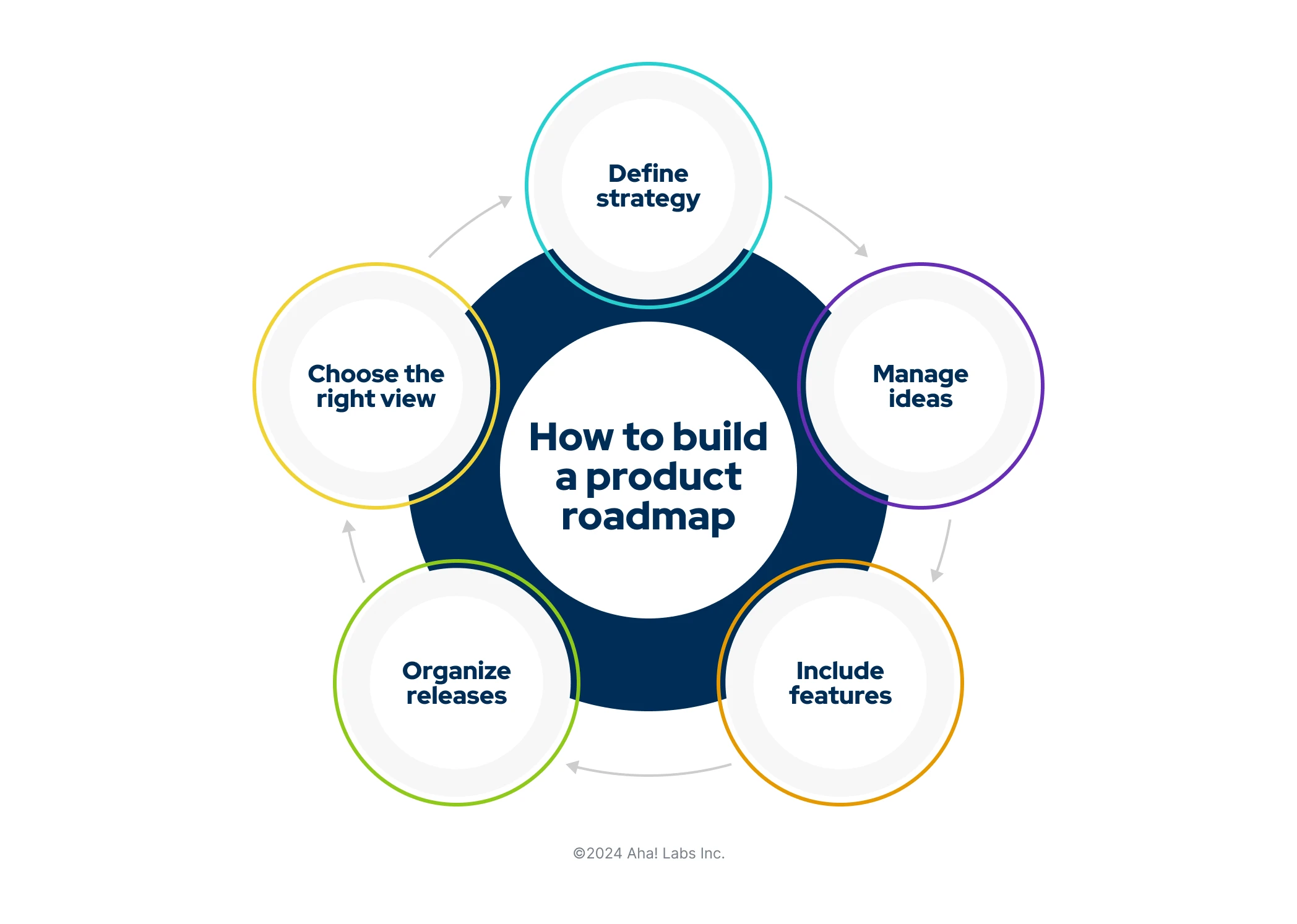
Define strategy
Zero in on the "why" behind your product, beginning with a strong product vision. Vision and strategy inform everything you include on your product roadmap.
Manage ideas
Gather input from partners, customer-facing internal teams, and of course, customers. Organize and prioritize the feedback — this will help you make trade-off decisions about what to put on your roadmap.
Define features and requirements
Keeping your strategy in mind, examine your prioritized ideas. Begin sketching out product plans and new functionalities with your team. Then, promote the product features you want to deliver to your roadmap — detailing requirements, assignees, and deadlines.
Organize releases
Once features are outlined, think through your delivery timeline with releases. Many teams use a Gantt chart to show phases, milestones, and associated dependencies.
Choose the right view
You can visualize your product roadmap template in several different ways depending on your audience. Roadmapping software allows you to toggle between views, so you can show the most relevant information. Read more on this below.
As a purpose-built roadmapping software company, it is no surprise that we have written extensively on this topic. Use the resources below to dig into building a product roadmap.
Product roadmap examples
Product teams rely on different types of product roadmaps to present information in varying levels of detail. What you choose to show depends on your audience and the information you want to communicate.
We have gathered a number of examples and templates below. Many of these can be found in Aha! software. And we have also included free downloads for product teams that want to try out various formats before committing to a tool.
Example product strategy roadmap
A strategy roadmap visualizes progress against product goals, along with the initiatives the team will pursue to achieve those goals. You may choose to roll product goals up to higher-level business goals to show exactly how the product development team’s work will support the organization’s objectives. The example below comes from Aha! Roadmaps.
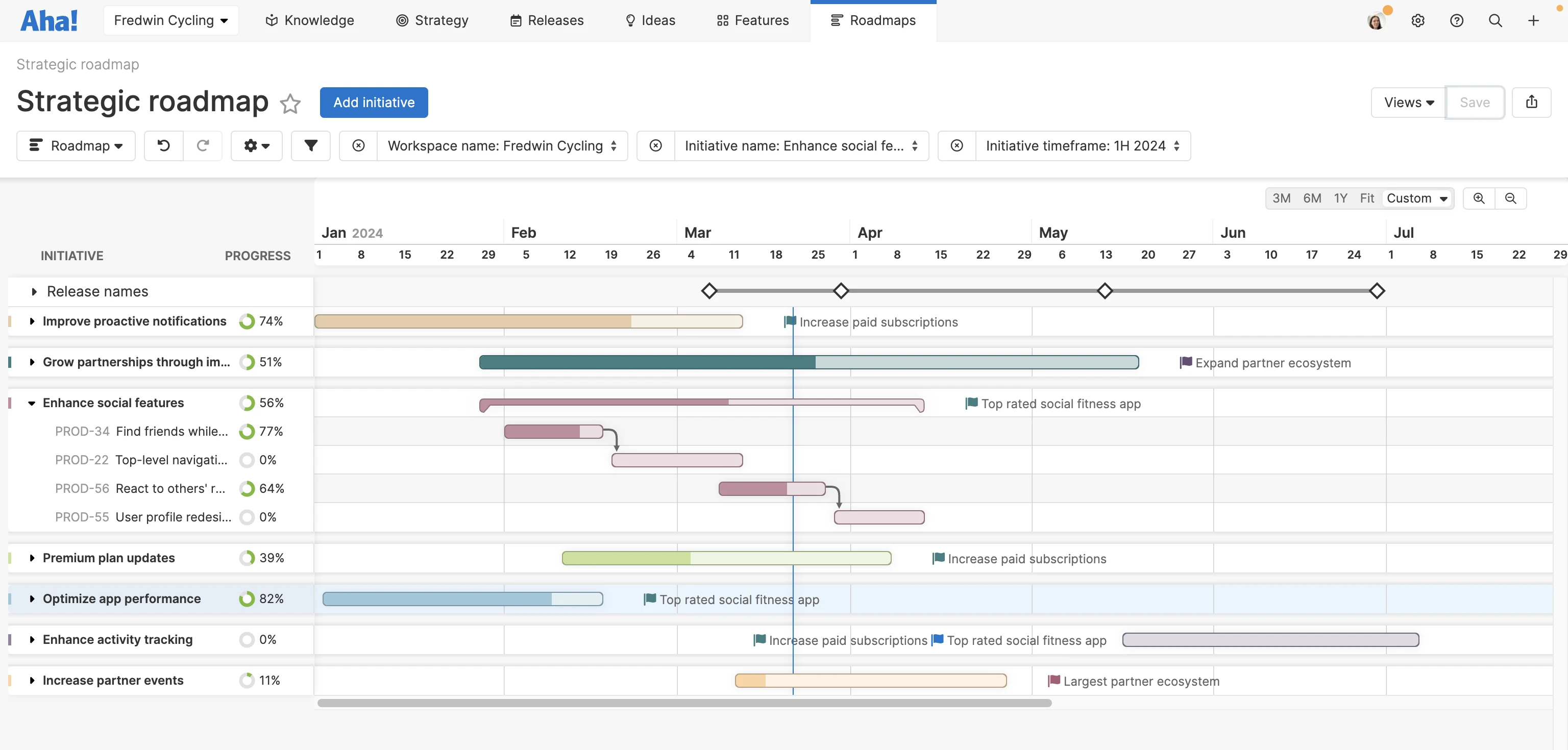
Example product innovation roadmap
A product innovation roadmap focuses on how a company will achieve an innovation strategy. The example below, included in Aha! Roadmaps, features strategic goals, initiatives, and critical areas of investment.
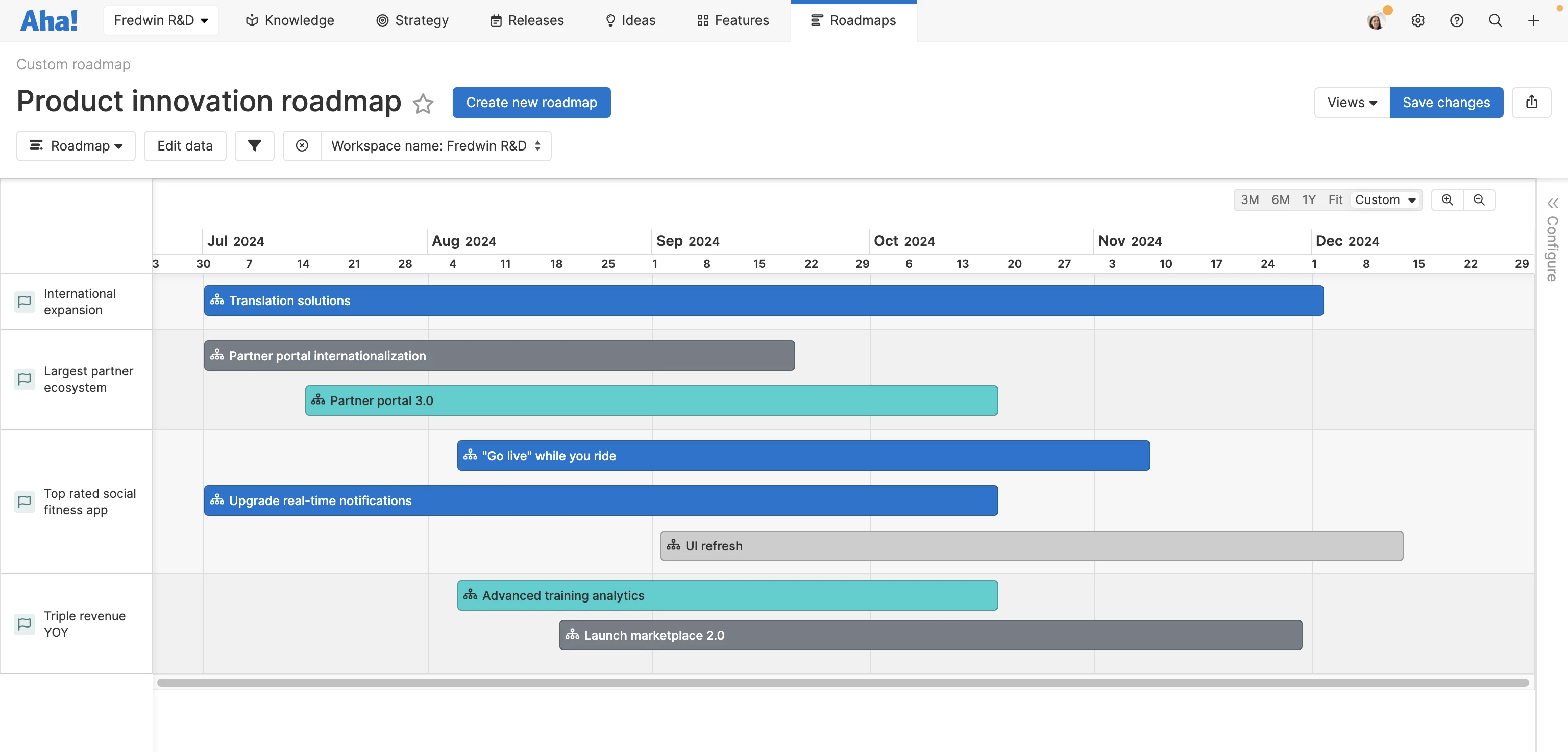
Example agile product roadmap
An agile product roadmap shows major themes of work on a loose timeline. It is common to see an agile roadmap with date ranges only — usually spanning the length of a quarter or two. The Aha! Roadmaps example below shows releases and epics.
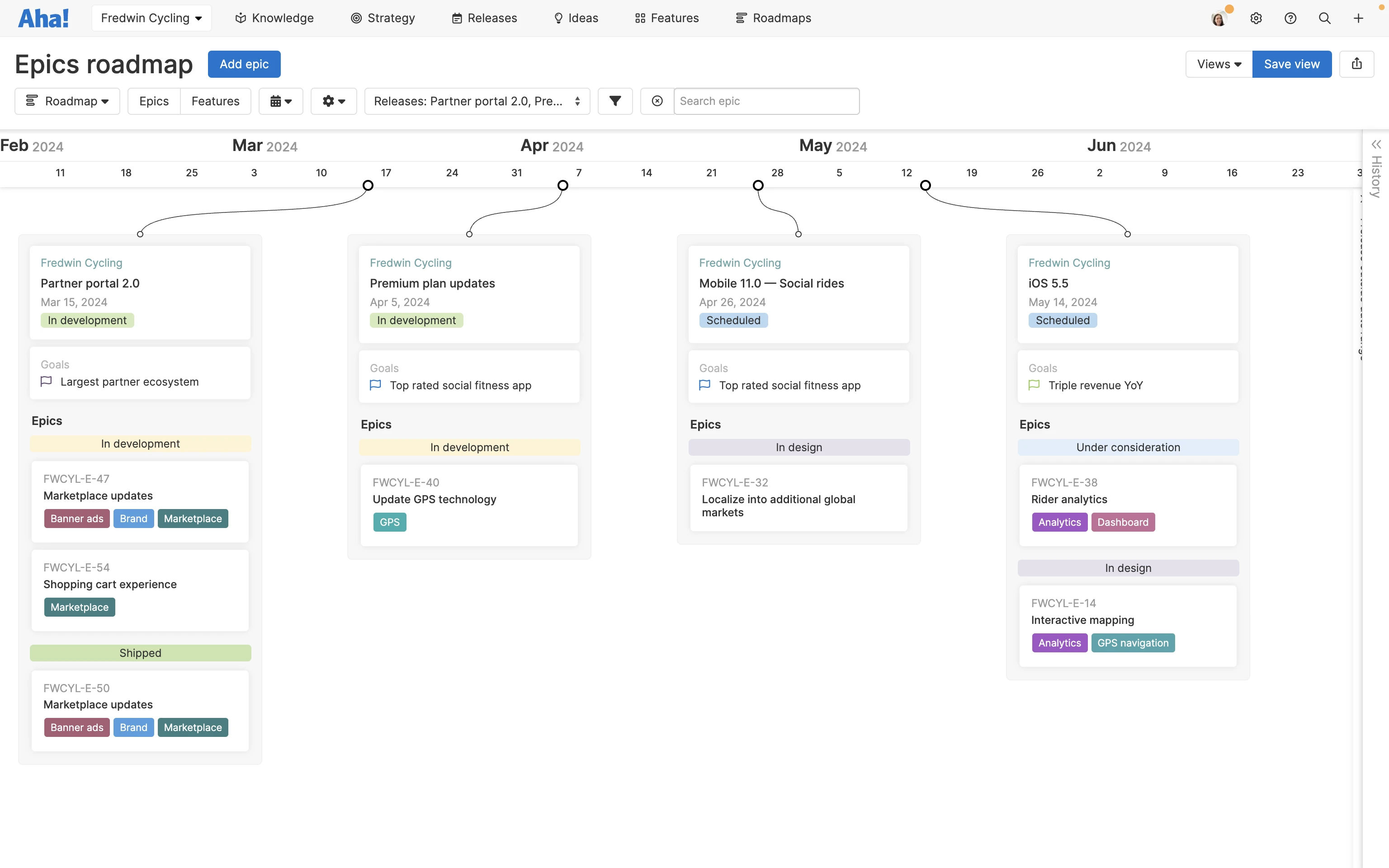
Strategic product roadmap templates
Your product strategy defines what you want to achieve (your goals) and how you plan to get there (your initiatives). Visualize both of these elements with the help of a strategic roadmap — giving you a big-picture view of your path to product success.
The first template below is a strategic roadmap template built on a whiteboard in Aha! software. After it, you will find a simplified Excel version for download — plus additional templates for mapping your goals and initiatives.
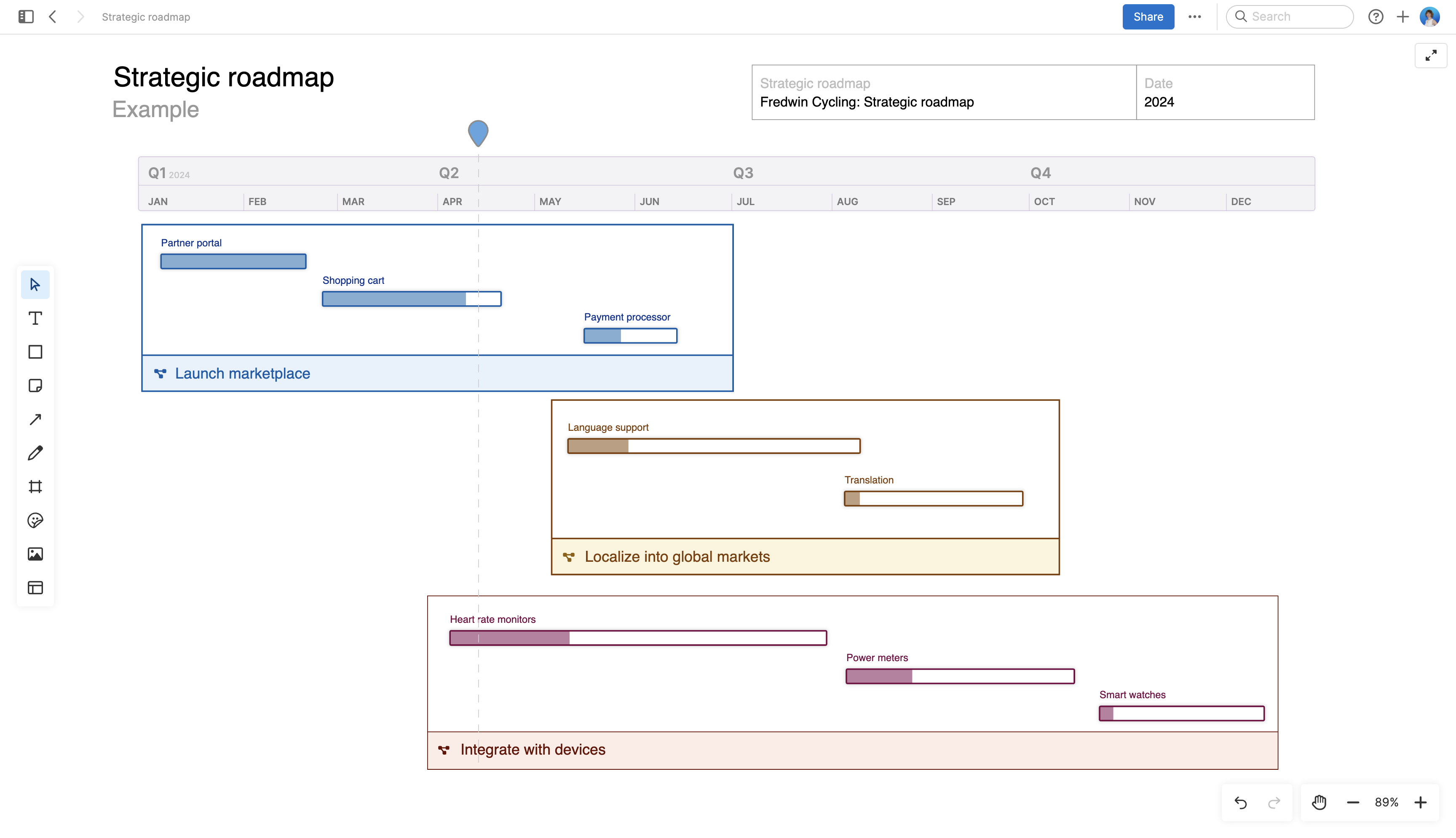
Goals roadmap template
Rally your team around your overarching objectives and provide context for what needs to be accomplished and when. The roadmap template below gives you a way to visualize how releases across products contribute to your goals over time.
Initiatives roadmap templates
Initiatives represent the high-level efforts needed to achieve your goals. Choose an initiatives roadmap to provide progress updates to leadership and other stakeholders. The first template shows a timeline for completing different initiatives and the goals they support. The next one goes a level deeper and shows how specific product releases across your portfolio contribute to business initiatives.
Starter product roadmap templates
You will need to share your product plans with a variety of stakeholders — from executives to customers to partners — at various stages throughout the product development process. With these audiences, you want to share just enough information. Diving into the details of exact timing or detailed functionality will distract from your message. These starter roadmap templates below are best suited for documenting and sharing very high-level information.
First up is our Now, Next, Later roadmap template in Aha! software. This one is built on a whiteboard so is ideal for quick, early-stage planning.
Below it you will find two additional starter roadmaps that can be downloaded as PowerPoint files.
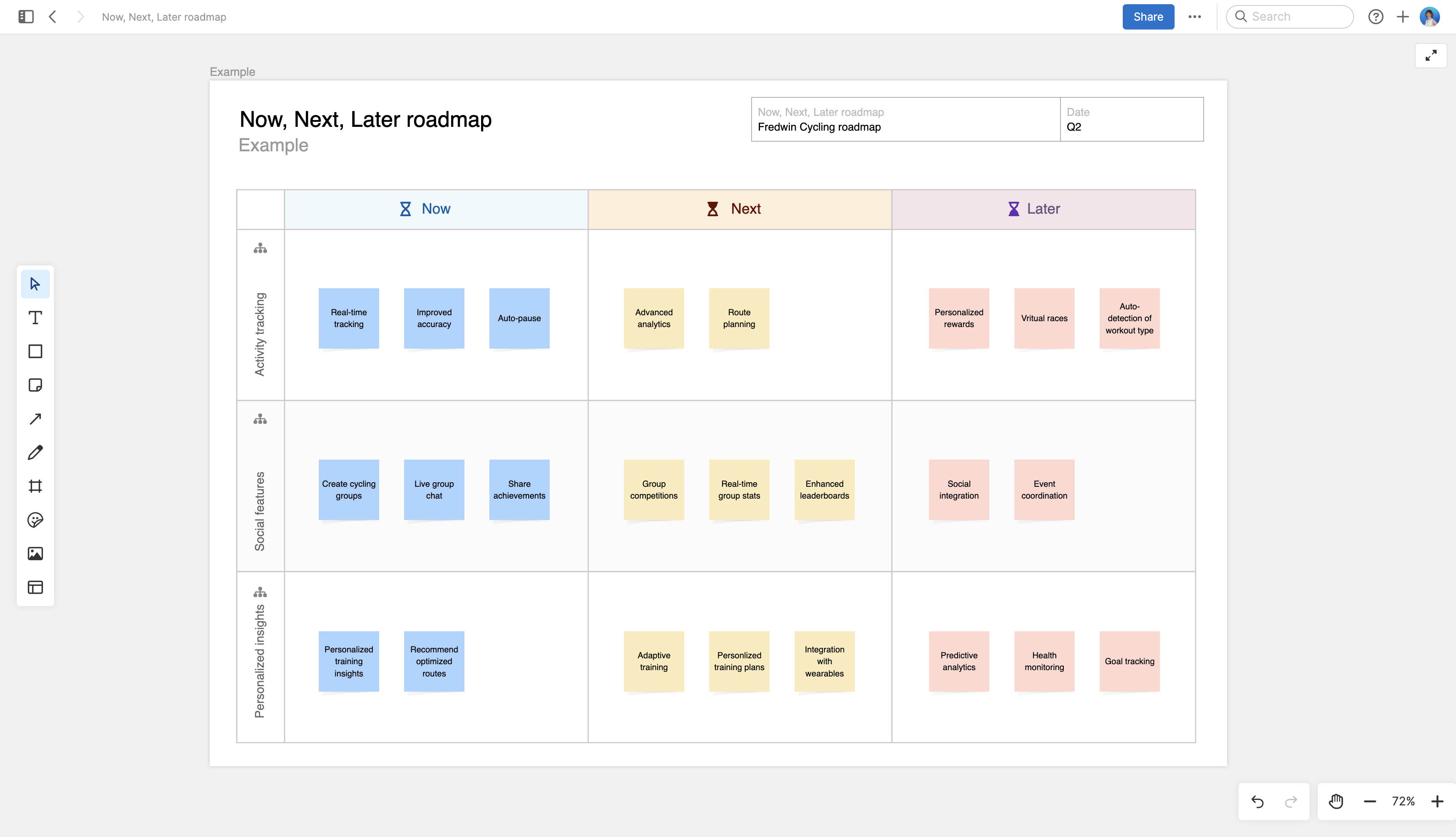
Portfolio roadmap templates
If you manage multiple products, you need a roadmap that showcases your entire portfolio and helps internal teams understand how their plans relate to each other. This first portfolio roadmap template is available for whiteboards in Aha! software — helping you get the team aligned on portfolio strategy with a simple view before turning it into a more structured plan.
The downloadable Excel roadmap below it shows release timelines and date markers for each product within a portfolio. You can also expand swimlanes and include initiatives for each product. And below that, the PowerPoint portfolio roadmap template uses simple swimlanes to show relevant releases for multiple products.
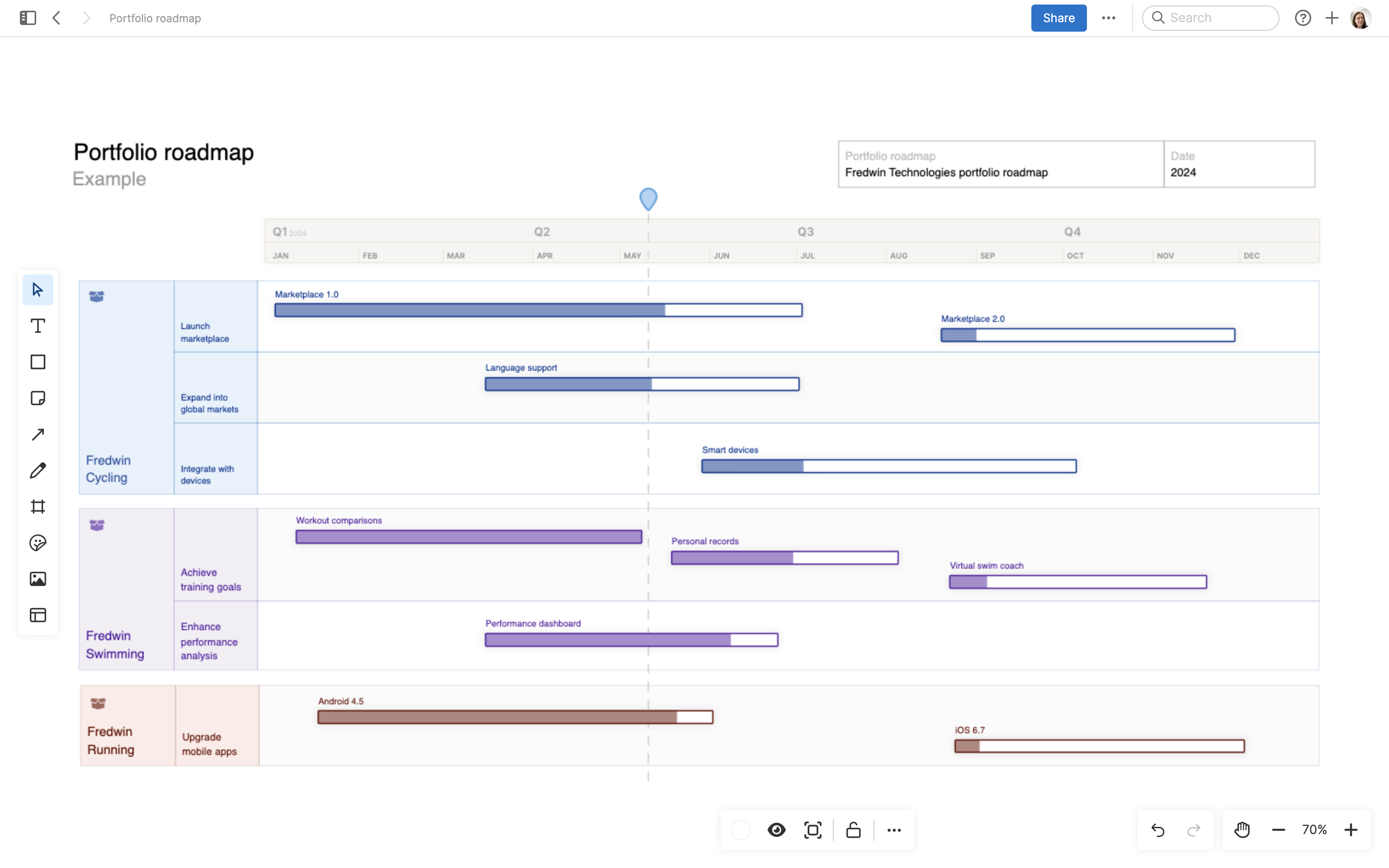
Release roadmap templates
The first release roadmap template included in this section is available as a whiteboard template in Aha! software. Use it to visualize the dates, deliverables, and dependencies of your release plans, then move detailed plans into a Gantt chart in Aha! Roadmaps — so everyone on the team can track how work progresses.
Below the whiteboard option, you will find an Excel template you can use to highlight phases and tasks within your release plan. And the PowerPoint below it shows upcoming releases, top features, and planned delivery dates.
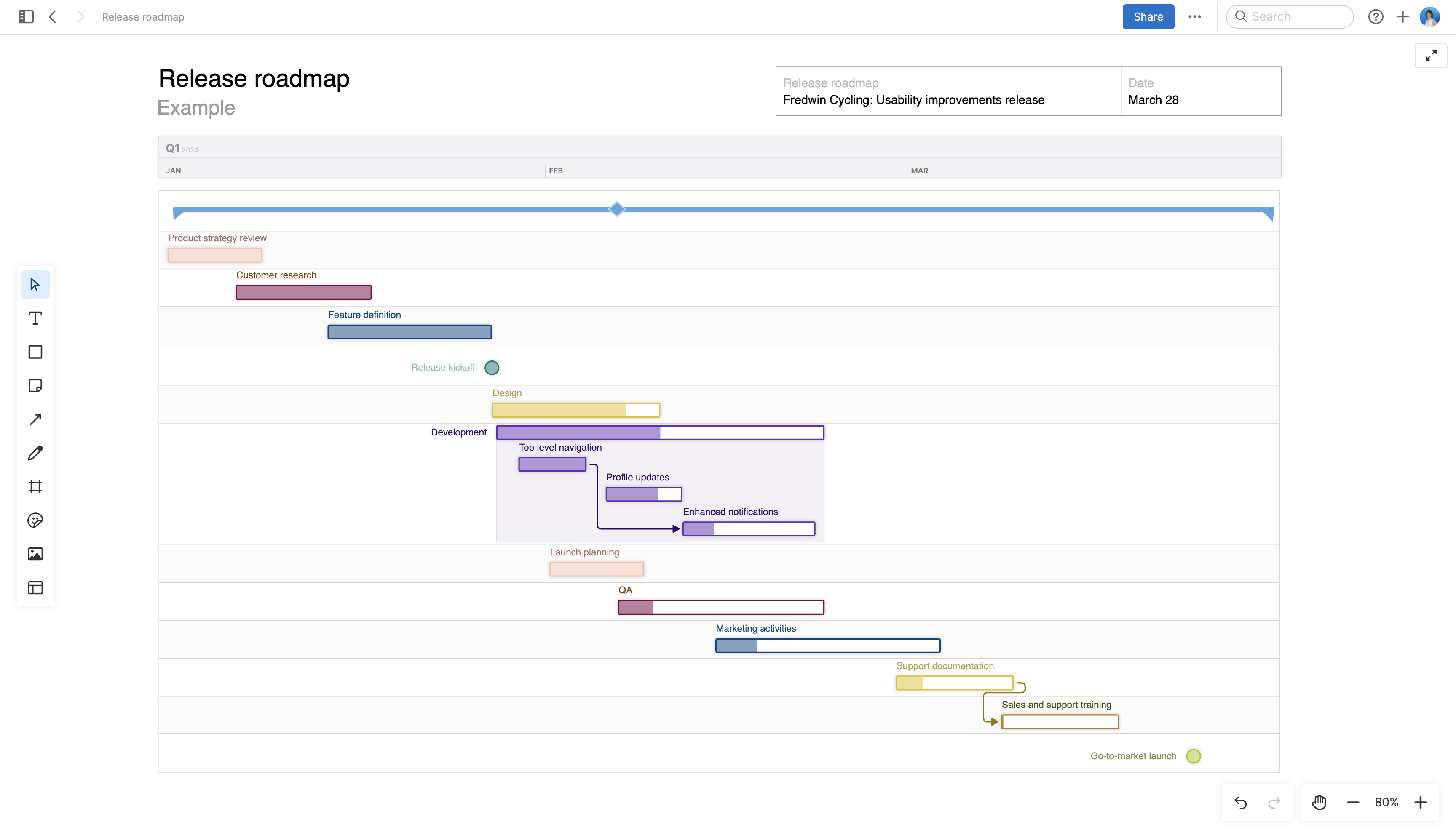
Epics roadmap templates
The epics roadmap templates below offer different ways to visualize your epics over time. You can customize the timelines to fit your needs, use markers to indicate releases or milestones, and change colors to indicate groupings or statuses. The first is an epics roadmap whiteboard template in Aha! software — the others are downloadable for Excel and PowerPoint.
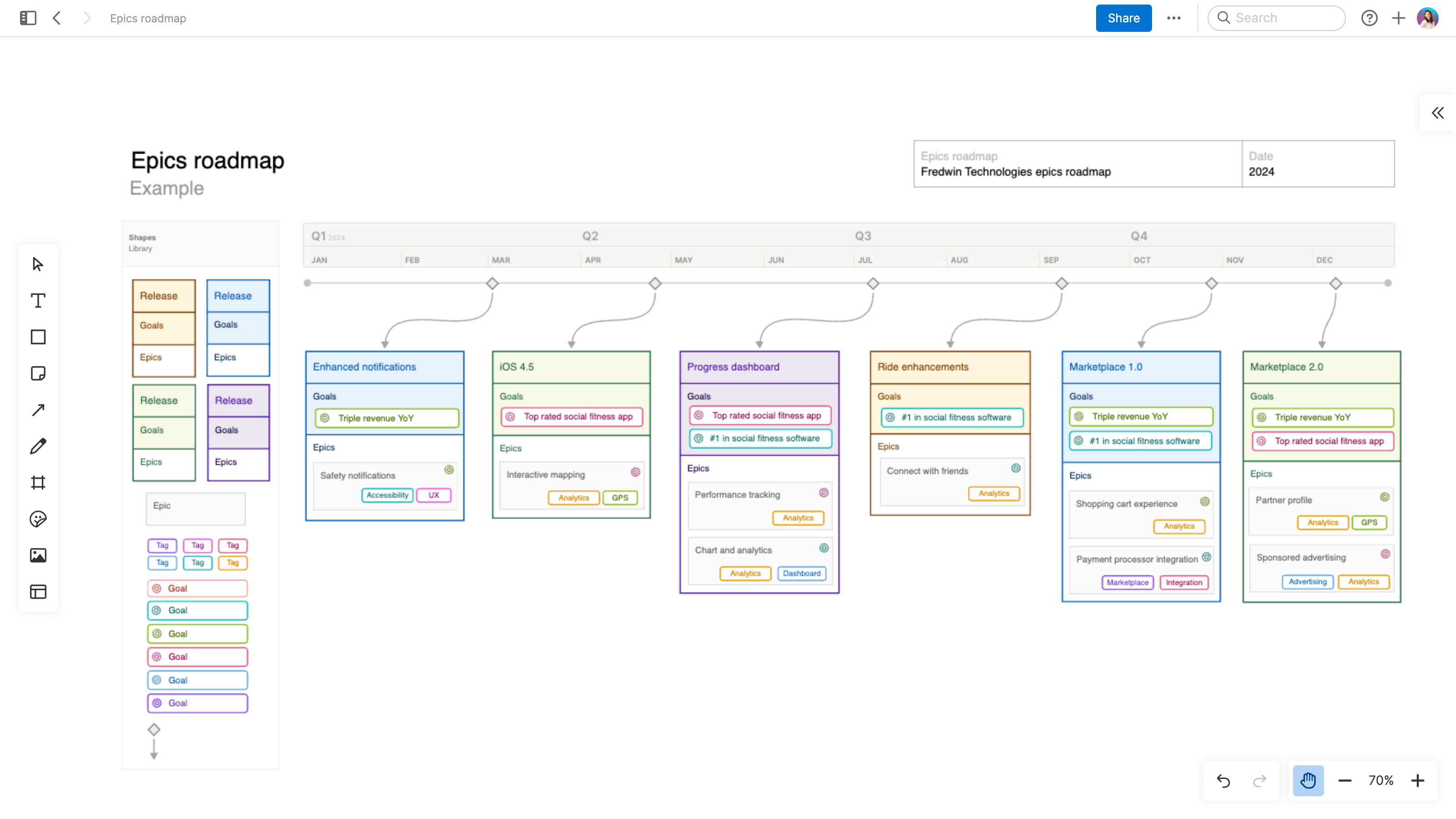
Feature roadmap templates
Feature roadmaps are detailed. This type of roadmap is all about near-term product plans — perfect for keeping the internal team on track. The first one is — you guessed it — a feature roadmap whiteboard template in Aha! software. The other two can be downloaded for Excel and PowerPoint.
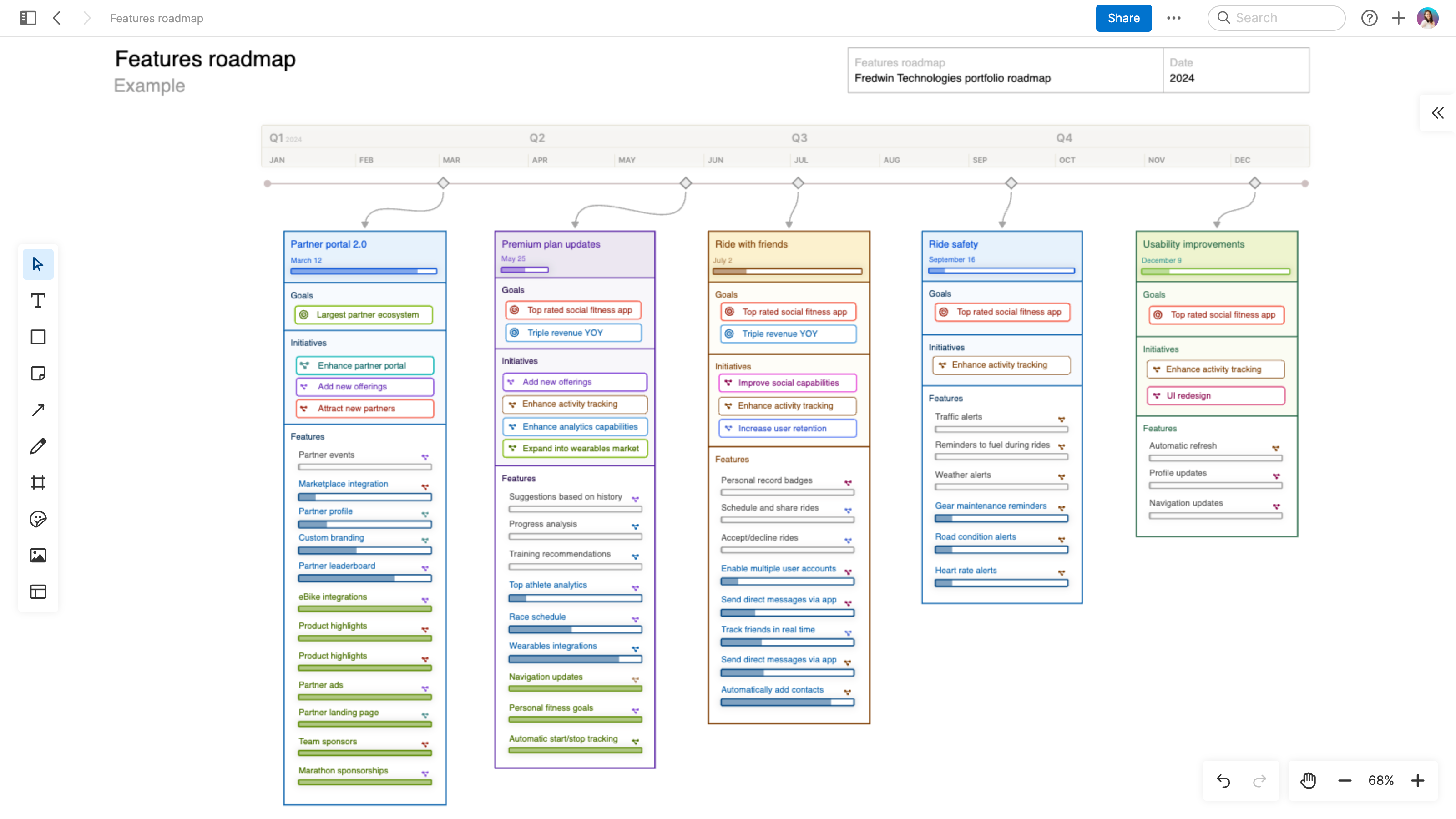
Agile product roadmap templates
Agile product teams often use elements like themes, user stories, and tasks to structure work. This structure can carry over to your agile roadmap.
The template below spotlights epics — with swimlanes to show how the work aligns with strategic themes. If you do not subscribe to a specific methodology, this is a good agile roadmap template to begin with.
Scrum product roadmap template
This scrum roadmap template is designed for engineering teams that follow scrum methodology. It shows where specific user stories fit within upcoming sprints. This simple roadmap is helpful for sharing development progress updates and communicating when new functionality will be demoed for stakeholders.
Kanban product roadmap templates
If your team follows kanban methodology, the roadmap templates below will look familiar — they resemble kanban boards. The first is a kanban board template on an Aha! whiteboard and the second is a PowerPoint download. Use either when you need to set expectations for internal and external stakeholders without committing to a specific time frame.
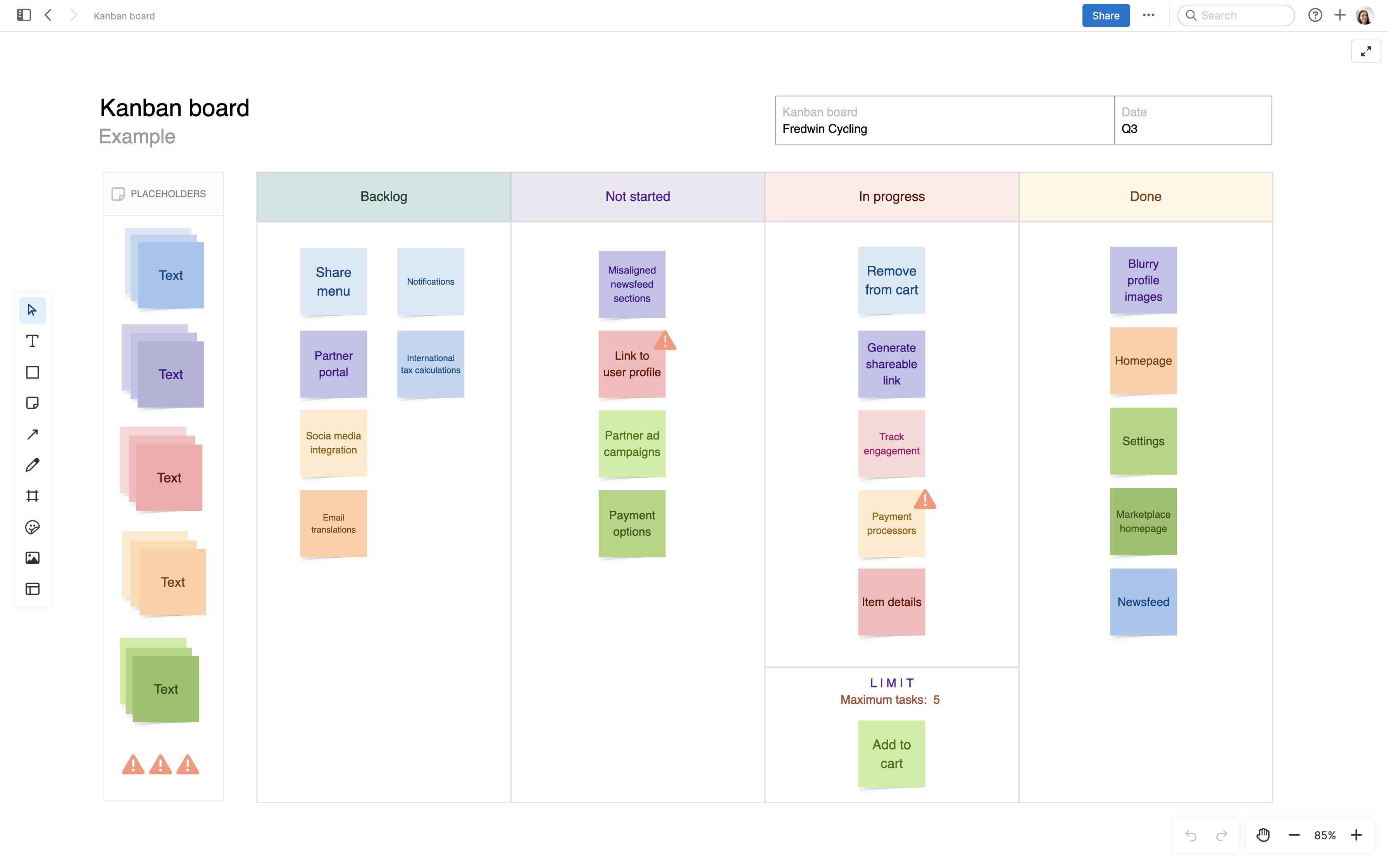
SAFe® product roadmap template
This Scaled Agile Framework (SAFe®) roadmap template will help you visualize your program increment (PI) milestones and objectives over a six-month time frame. A SAFe® roadmap offers visibility into current PI deliverables and forecasted PIs. It also helps to ensure that near-term plans align with overall business priorities before PIs are committed.
If you would rather start PI planning on a whiteboard, we offer a collection of PI planning whiteboard templates.
FAQs about product roadmaps
A product roadmap is a visualization of your product plans — from your strategic goals and initiatives down to individual product features. Product roadmaps indicate where your product is headed, your timeline, and the work required to get there.
Product managers use product roadmaps to communicate progress and priorities. Roadmaps are essential visual tools in presentations to internal teams or external stakeholders, like partners or customers. A solid product roadmap also helps product teams assess how new requests for functionality align with the product's strategic direction and work that is already planned.
If you are just getting started, our introductory product roadmap guides offer a good foundation:
A roadmap typically includes the following components:
Product goals
Strategic initiatives
Key releases
Features or feature sets (epics)
Overall timeline
Visual elements (e.g., colors and swimlanes)
Swimlanes on a product roadmap are visual representations of different groups of data. For example, you might use swimlanes to display all of the features that make up a release.
Product roadmaps are dynamic. As your plans change, so should your roadmap. How often you update your roadmap is up to you — but it is important that your product roadmap reflects current goals and progress. This keeps the team aligned on priorities and promotes transparent communication. The most efficient way to do this is by using purpose-built software that automatically integrates strategic planning with roadmapping. That way you can be sure your product plans are always up to date.
With the right tool, roadmapping becomes an art — helping everyone get excited and aligned on upcoming product plans and milestones. Together, you can create a shared understanding of how you will reach your product goals. When you do, you make the team and the product stronger.
